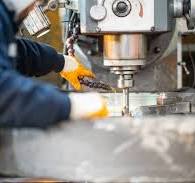
Metalworking fluids (MWFs) are a cornerstone of modern industrial processes, playing a vital role in metal cutting, forming, and machining operations. These fluids are essential for lubrication, cooling, and extending the lifespan of tools and machinery. With Nigeria’s expanding industrial base, the demand for metalworking fluids production in Nigeria has been on the rise, presenting a significant opportunity for local manufacturing and investment.
Nigeria’s industrial sector, driven by rapid urbanization, infrastructural development, and an increasing focus on manufacturing, has led to a growing demand for metalworking fluids. The country’s automotive, construction, and heavy machinery industries rely heavily on MWFs for efficient production processes.
Additionally, Nigeria’s status as an oil-rich nation and its burgeoning energy sector further amplify the need for these fluids in equipment maintenance and machining operations.
The key raw materials for metalworking fluids production include:
Base Oils: Mineral or synthetic oils form the primary component of MWFs, providing lubrication and heat dissipation properties.
Additives: These enhance performance, including corrosion inhibitors, emulsifiers, biocides, and extreme pressure agents.
Water: Used in water-soluble fluids, ensuring cost-effectiveness and efficient cooling.
Nigeria’s oil reserves offer a substantial source of base oils. With improved refining capabilities and strategic sourcing of additives, the country could reduce dependency on imports and boost local production.
Metalworking fluids are categorized based on their composition and application:
Straight Oils: Non-emulsifiable oils used for heavy-duty machining.
Soluble Oils: Form emulsions when mixed with water, offering both cooling and lubricating properties.
Synthetic Fluids: Contain no oil and provide excellent cooling and cleanliness.
Semi-Synthetic Fluids: A blend of soluble oils and synthetic components, offering a balance of lubrication and cooling.
Manufacturing MWFs involves a systematic process:
Base Oil Selection: Choosing the appropriate oil based on the desired fluid type and application.
Additive Blending: Precise mixing of additives to enhance the fluid’s properties.
Emulsification: Creating stable oil-water emulsions for water-soluble fluids.
Quality Control: Rigorous testing to ensure the fluid meets industry standards.
Packaging and Distribution: Proper storage and logistics to deliver high-quality products to end users.
Metalworking fluids are indispensable in industrial processes, including:
Machining and Cutting: Reducing friction and heat in processes like drilling, milling, and grinding.
Forming: Enhancing material flow during forging, stamping, and extrusion.
Corrosion Prevention: Protecting metal surfaces during and after machining.
Equipment Maintenance: Prolonging the life of tools and machinery.
The global metalworking fluids market size was estimated at USD 12.17 billion in 2023 and is expected to grow at a compound annual growth rate (CAGR) of 4.9% from 2024 to 2030. The product demand is anticipated to be driven by increased demand for automotive and heavy industry machinery.
Leading producers include the United States, Germany, Japan, and China, driven by their strong industrial bases and technological innovations. Major exporters like the U.S. and Germany supply high-performance fluids worldwide, while key importers such as India and Brazil rely on these products for their growing industries.
In Nigeria, the metalworking fluids market remains underdeveloped, with heavy reliance on imports from global producers like Shell, ExxonMobil, and TotalEnergies. Local production is limited, primarily due to challenges such as inadequate infrastructure, limited technical expertise, and high production costs. However, there is a clear opportunity for Nigeria to develop its manufacturing capabilities, especially with the government’s focus on industrialization and economic diversification.
Challenges in Metalworking Fluids Manufacturing in Nigeria
Several challenges hinder the growth of the MWF manufacturing sector in Nigeria:
Infrastructure Gaps: Insufficient production facilities and unreliable power supply.
Dependence on Imports: High costs of importing additives and advanced production equipment.
Regulatory Barriers: Inconsistent policies and a lack of standardization in the industry.
Skill Shortage: Limited availability of skilled professionals in chemical engineering and manufacturing.
Environmental Concerns: Disposal and treatment of used MWFs require adherence to environmental regulations.
Trends in Metalworking Fluids Manufacturing
The metalworking fluids market is evolving, driven by several trends:
Sustainability: Increasing focus on biodegradable and environmentally friendly fluids.
Technological Advancements: Use of nanotechnology and high-performance additives to enhance fluid properties.
Local Production: Efforts to establish domestic manufacturing facilities to reduce import dependency.
Automation: Integration of automated systems in fluid blending and quality control processes.
Industry 4.0: Adoption of data-driven solutions to optimize production and monitor fluid performance.
Unlocking Opportunities for Local Manufacturing
To unlock Nigeria’s potential in metalworking fluids manufacturing, strategic actions are necessary:
Investing in Infrastructure: Establishing modern production facilities and improving refining capacities.
Promoting Research and Development: Collaborating with academic institutions to develop advanced fluid formulations.
Government Support: Implementing favorable policies, tax incentives, and funding for local manufacturers.
Skill Development: Training programs to build a competent workforce in chemical engineering and industrial production.
Public-Private Partnerships: Encouraging collaboration between the government and private sector to boost local production.
Nigeria’s growing industrial base and abundant raw materials provide a strong foundation for developing its metalworking fluids manufacturing sector. By addressing challenges and leveraging trends such as sustainability and technological innovation, the country can reduce its reliance on imports, create jobs, and enhance industrial productivity.
Unlocking Nigeria’s potential in metalworking fluids manufacturing is not only a viable economic opportunity but also a strategic step toward achieving self-reliance in industrial production.
Anaekwe Everistus Nnamdi
Founder & Market Research Analyst
Foraminifera Market Research Limited
foraminiferaltd@gmail.com or +2348033782777 (call and whatsapp)
https://foramfera.com/
Investment Opportunities in Nigeria | Business Opportunities in Nigeria | Profitable Industries in Nigeria | Investment Landscape in Nigeria | SME Opportunities in Nigeria | Foreign Direct Investment in Nigeria | Emerging Markets in Nigeria |
Custom Research Request
Still haven't found what you're looking for?
Speak to our Custom Research Team.
